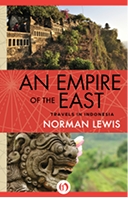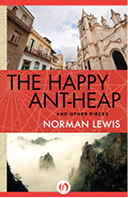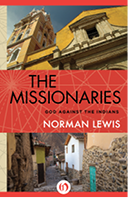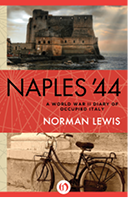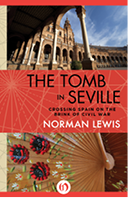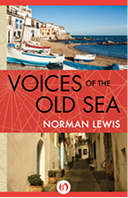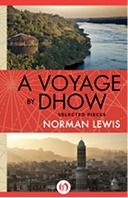Tomb in Seville (16 page)
Authors: Norman Lewis

‘Please excuse me,’ he said. ‘I’m turning my back on modern times.’
T
HE FINAL LEG OF
our journey back to England, by ship, had been arranged through a Spanish tourist agency at extremely low rates, and they had warned of possible uncertainties awaiting us. We were greeted with almost excessive affability by the ship’s officers lined up at the top of the gangplank, and a substantial bouquet of flowers did something to mitigate the austerity of our cabin. Remote rumbles and gruntings proclaimed the engine had started. Very shortly afterwards we were asked to attend lifeboat drill, and the chance of rough weather ahead was hinted at.
Eugene suddenly broke into my thoughts, and I realised that something was the matter.
‘I need a drink,’ he said. ‘I’ve done the wrong thing.’
‘What’s bothering you?’ I asked him. ‘Everything has gone off all right so far.’
‘I’ve let myself down.’
‘I don’t understand you.’
‘I realise now I should have stayed.’
‘What on earth for?’
‘I want to get back on good terms with my conscience.’
‘Is this something to do with the Civil War?’
‘I’m afraid it is,’ Eugene said.
‘I realise how you feel,’ I told him, ‘but for all that you should wait for the right moment.’
‘This is it. Did you see the headline in that Spanish rag
Debate,
about soldiers of fortune flooding into Spain?’
‘I read it but I didn’t necessarily believe it.
Debate
is a fascist paper.’
‘It’s common knowledge that Franco has been enlisting mercenaries to take on any who turn out to be left-wingers.’
‘Don’t let’s delude ourselves. Mercenaries or not, they’ll put up a fight.’
‘A gang of thugs,’ Eugene said. ‘We’d make mincemeat of them.’
I saw him as just too certain of victory. There were times when his brand of optimism appeared to me almost as a weakness.
‘Think it over,’ I said. ‘Think about it before you commit yourself to something you may come to regret.’
Once back in London, it soon became clear to Ernesto that Eugene was keen to continue his involvement with his beloved
Ayuda
project. He and I were both on the lookout for jobs. We hadn’t seen each other for some time when I had a call from Eugene.
‘I’ve decided I’m going back to Spain.’ There seemed to be relief in his voice.
‘Why? When?’
‘It’s a touchy situation. I’m anxious to get over there while the going is still good. Nobody knows exactly what’s likely to happen next. The offer came for me to go, and the thing is not to hang about, but to grab the opportunity while I can.’
‘Well, I wish you the very best of luck. I hope I’ll see you before you go, and keep in touch.’
‘As they say,
venceremos.
We’re going to win. Join us if you can.’
A
T ABOUT THIS TIME,
the modestly left-wing caretaker government of Largo Caballero, convinced of the hopelessness of defending Madrid from attack by the fascist leader General Franco, lost face by deserting the historic site of the capital in favour of Valencia on the coast. Inevitably the fascist regimes of Germany and Italy were behind Franco, but at least no efforts were made by democratic governments to prevent their nationals from joining International Brigades.
Franco’s German allies were called in to devastate the ancient Basque town of Guernica, while Italian troops were imported to massacre Spanish peasants regarded as a result of their poverty as ‘left wing’. Indignity was piled upon our Spanish friends in Seville, where Moroccan mercenaries massacred more peasants in the countryside and German soldiers of fortune invaded the city itself. An attack by German warplanes in this area was reported to have caused the loss of 30,000 lives. It was estimated that a further 30,000 casualties were suffered by random though persistent attack, largely by foreign planes, in the Ebro valley.
Eugene was among the first from England to enlist in the International Brigades, but it came as no surprise that he would do so only as an ambulance driver—which he remained until the withdrawal of his brigade in November 1938. He had been lucky enough to escape being wounded, but he had suffered ill-health through periods of semi-starvation throughout the campaign, and it was this that abruptly shortened his life.
Norman Lewis (1908–2003) was one of the greatest English-language travel writers. He was the author of thirteen novels and fourteen works of nonfiction, including
Naples ’44
,
The Tomb in Seville
, and
Voices of the Old Sea
. Lewis served in the Allied occupation of Italy during World War II, and reported from Mafia-ruled Sicily and Vietnam under French-colonial rule, among other locations. Born in England, he traveled extensively, living in places including London, Wales, Nicaragua, a Spanish fishing village, and the countryside near Rome.
All rights reserved under International and Pan-American Copyright Conventions. By payment of the required fees, you have been granted the non-exclusive, non-transferable right to access and read the text of this ebook onscreen. No part of this text may be reproduced, transmitted, downloaded, decompiled, reverse engineered, or stored in or introduced into any information storage and retrieval system, in any form or by any means, whether electronic or mechanical, now known or hereinafter invented, without the express written permission of the publisher.
Copyright © 2003 by the Estate of Norman Lewis
Introduction copyright © 2003 by Julian Evans
Cover design by Kelly Parr
978-1-4804-3326-7
This edition published in 2013 by Open Road Integrated Media
345 Hudson Street
New York, NY 10014

